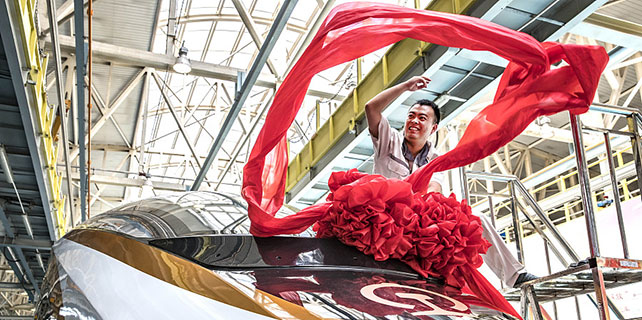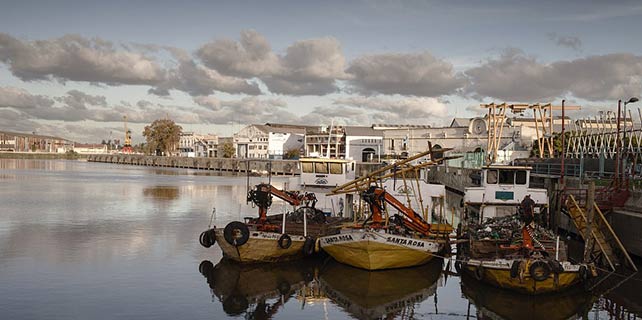China amends laws to allow public interest litigation
BEIJING -- China's top legislature on Tuesday passed amendments to the civil and administrative procedure laws to allow prosecutors to institute public interest litigation. The amendments, which will go into effect on July 1, were adopted at the bimonthly session of the Standing Committee of the National People's Congress, which ran from Thursday to Tuesday.
Prosecutors are allowed to file civil lawsuits against any act that compromises public rights and interest in cases related to protection of environment and resources, as well as food and drug safety, according to the amendment to the Civil Procedure Law.
They can also file an administrative lawsuit for abuse of power or nonfeasance in cases concerning protection of environment and resources, food and drug safety, preservation of state assets, and transfer of state-owned land use rights, according to the amendment to the Administrative Procedure Law.
Prosecutors should make suggestions to government departments and push them to fulfil their duties before taking them to court, it added.
These areas have a direct bearing on national and public interest and are issues of high public concern, said procurator-general Cao Jianming while explaining the draft amendments to lawmakers.
Before amending the laws, in July 2015 the Supreme People's Procuratorate began a two-year pilot program allowing prosecutors in 13 provincial divisions to institute public interest litigation in administrative and civil cases.
By the end of May 2017, procuratorates had handled 7,886 public interest lawsuits and filed 934 cases in the pilot reform.
In 4,358 cases, administrative departments took the initiative to correct the wrongdoings. In all the cases that eventually went to court, judges ruled in 222 cases, all in favor of the prosecutors.
Prosecutors in the pilot areas helped restore 128,000 hectares of arable land, forest, wetland and grassland, ordered more than 1,400 companies to rectify their behavior, and retrieved state assets worth 6.5 billion yuan (952 million U.S. dollars) in the past two years.
The practice of engaging prosecutors in public interest litigation has proven feasible, and will promote rule of law and improve the socialist judicial system with Chinese characteristics, said Cao.
Public interest litigation is fairly new in China. For years plaintiffs have been strictly confined to citizens, corporations, and organizations whose interests are directly related to a lawsuit.
An amendment to the Civil Procedure Law in 2012 first allowed agencies or organizations to bring litigation against those who undermined public welfare by polluting or infringing on consumers' interests, which was considered a major step forward in creating a public interest litigation system in China.
The revision to the Environmental Protection Law in April 2014 continued the process, allowing environmental organizations to institute public interest litigation.
Engaging prosecutors in public interest litigation was included in a comprehensive legal reform plan adopted at the fourth plenary session of the 18th Communist Party of China Central Committee in 2014.
Prosecutors are allowed to file civil lawsuits against any act that compromises public rights and interest in cases related to protection of environment and resources, as well as food and drug safety, according to the amendment to the Civil Procedure Law.
They can also file an administrative lawsuit for abuse of power or nonfeasance in cases concerning protection of environment and resources, food and drug safety, preservation of state assets, and transfer of state-owned land use rights, according to the amendment to the Administrative Procedure Law.
Prosecutors should make suggestions to government departments and push them to fulfil their duties before taking them to court, it added.
These areas have a direct bearing on national and public interest and are issues of high public concern, said procurator-general Cao Jianming while explaining the draft amendments to lawmakers.
Before amending the laws, in July 2015 the Supreme People's Procuratorate began a two-year pilot program allowing prosecutors in 13 provincial divisions to institute public interest litigation in administrative and civil cases.
By the end of May 2017, procuratorates had handled 7,886 public interest lawsuits and filed 934 cases in the pilot reform.
In 4,358 cases, administrative departments took the initiative to correct the wrongdoings. In all the cases that eventually went to court, judges ruled in 222 cases, all in favor of the prosecutors.
Prosecutors in the pilot areas helped restore 128,000 hectares of arable land, forest, wetland and grassland, ordered more than 1,400 companies to rectify their behavior, and retrieved state assets worth 6.5 billion yuan (952 million U.S. dollars) in the past two years.
The practice of engaging prosecutors in public interest litigation has proven feasible, and will promote rule of law and improve the socialist judicial system with Chinese characteristics, said Cao.
Public interest litigation is fairly new in China. For years plaintiffs have been strictly confined to citizens, corporations, and organizations whose interests are directly related to a lawsuit.
An amendment to the Civil Procedure Law in 2012 first allowed agencies or organizations to bring litigation against those who undermined public welfare by polluting or infringing on consumers' interests, which was considered a major step forward in creating a public interest litigation system in China.
The revision to the Environmental Protection Law in April 2014 continued the process, allowing environmental organizations to institute public interest litigation.
Engaging prosecutors in public interest litigation was included in a comprehensive legal reform plan adopted at the fourth plenary session of the 18th Communist Party of China Central Committee in 2014.
















